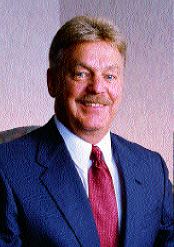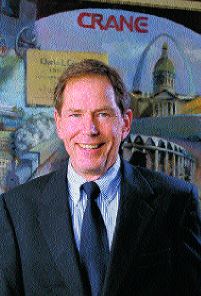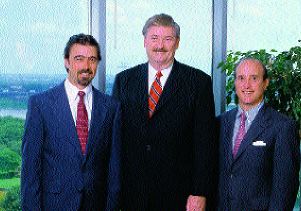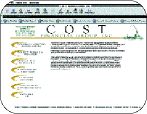

David E. Gebhardt (left), president and founder of COST Financial Group, enjoys a strong working relationship with Fielding Childress, executive vice president of Charles L. Crane Agency Company, who also serves as president of the agency's premium finance subsidiary.
When a client asks you about premium financing options, does your face light up with joy, or do you groan inwardly? If your reaction is the latter, chances are you either deal with an outside premium finance company or are struggling to keep up with the myriad details of operating your own in-house facility. If you use an outside company, you probably encounter few hassles--but likewise you're not doing much for your bottom line. If you've gone the in-house route, or are considering doing so, you face a daunting array of challenges, from obtaining a license, purchasing software, and securing loan commitments to hiring and training staff and implementing appropriate systems and procedures. Either way, you're not enhancing profitability--and you may be consuming a lot of aspirin to combat your constant headache.
What if you could enjoy the benefits of owning your own premium finance company--without the complications of forming and running it? We'll talk with Dave Gebhardt, founder and president of COST Financial Group in St. Louis, Missouri, which offers just such a solution to agents and brokers nationwide. We'll also speak with Fielding Childress, senior vice president of the Charles L. Crane Agency in St. Louis, who serves as president of the agency-owned premium finance company that COST Financial formed and now operates on Crane's behalf.
Premium finance at a glance
Before we discover how COST Financial's programs work, let's get a brief overview of the premium finance industry today. "According to industry sources, including A.M. Best, gross written premiums in the property/
casualty industry are between
$235 billion and $240 billion," Gebhardt explains. "Of that amount, between 10% and 15% is financed." Premium finance companies, he says, generally can be divided into three classes: (1) large national companies, (2) regional companies, and (3) local or specialty companies that concentrate on a smaller or specific area of financing. "Many larger premium finance companies are owned by insurance companies or banks, while many smaller companies are independently owned," he notes.
"The profit potential for the industry as a whole remains excellent," Gebhardt asserts. "As the insurance market hardens, premiums will rise, capacity and underwriting conditions will become more restrictive, and free or low-cost financing programs offered by insurance companies will become less available." These factors, he says, will cause an increase in the demand for premium financing.
 "Many agents are simply unaware of the tremendous profit potential of owning a premium finance subsidiary."
"Many agents are simply unaware of the tremendous profit potential of owning a premium finance subsidiary."
--David E. Gebhardt
David E. Gebhardt, founder and president of COST Financial Group.
Finding a better way
Gebhardt, whose 26-year career encompasses management responsibilities in insurance underwriting, wholesaling, and premium finance, says his experience convinced him that there had to be a better way for independent agents to deal with--and profit from--the financing of their clients' premiums. "COST was formed in 1989 with three founding principles," he says: "Find a need. Fill that need. Always deliver more than you promise." In 1989, Gebhardt explains, "Most premium finance companies were very restrictive in the types of financing programs they offered. There were strict limits on the sizes of accounts financed. Down payments were non-negotiable, rates were inflexible, and most premium finance companies were unwilling to share any of the finance charges with the insurance agency that produced the business, even where this was permitted by state law." As a result, "Agents were serving as a free, unpaid marketing force for premium finance companies. Finance companies tried to convince agents that they were doing them a favor by financing their business, enabling the agents to write more insurance," Gebhardt observes. "I can't imagine an agency representing an insurance company on those terms. Our program is designed to put the profit from premium finance where it belongs--in the agent's pocket."
Untapped profits
"Many agents," Gebhardt declares, "are simply unaware of the tremendous profit potential of owning a premium finance subsidiary. COST clients generally earn a net profit of between $30,000 and $40,000 for every $1 million they finance through their own company. This is far in excess of any commission or rebate an agency would receive from doing business with an outside company." Many states, he notes, prohibit an agency from receiving commissions from outside premium finance companies, "but an agency or its principals can own a premium finance company in any state."
Despite the tremendous profit potential, Gebhardt says, many agents shy away from owning a premium finance company. He cites a number of reasons:
* They don't know how to form and run the company.
* They don't want to do the considerable back-room work needed for the company to function properly.
* They don't want to hire and manage the staff required.
* They don't want their policyholders to know that it is the agency lending them money.
 Fielding Childress, executive vice president of Charles L. Crane Agency Company and president of the agency's premium finance subsidiary.
Fielding Childress, executive vice president of Charles L. Crane Agency Company and president of the agency's premium finance subsidiary.
The COST solution
"The COST Insurance Premium Finance Company Management System solves those problems," Gebhardt asserts. "Our program is equally appropriate for retail agencies, MGAs/wholesalers, and insurance companies, provided they have sufficient volume to finance. If an agency can identify approximately $50,000 per month in financing, it makes sense to explore this option," he says. "When an agency owner sees the profit potential and how easily the program works, he or she offers financing more readily and volume increases." Although premium financing is equally appropriate for commercial and personal lines, Gebhardt says, "The largest portion of our business is commercial. Most standard personal lines carriers offer direct bill with little or no charge. The one exception is substandard auto."
In what specific ways can an agency benefit from letting COST Financial form and operate an in-house premium finance unit? In addition to the profit potential mentioned earlier, Gebhardt cites a number of advantages to using the COST program:
* COST has the expertise to run the company.
* COST does all the back-room work and performs all administrative, management, and bookkeeping functions on an ongoing basis. The agency needs no additional equipment or staff.
* The address and telephone number of the agency's premium finance company are COST's, so borrowers deal with COST's personnel, not the agency's.
* COST's modest per-account fee makes the premium finance unit's expenses variable, so there are no fixed expenses to meet.
* The agency, with assistance from COST, determines the down payments, finance rates, and late charges, within legal parameters, so the agency stays in control of the premium finance process.
* Any size account can be financed; there is no minimum or maximum amount.
* The agency owner is building a profitable business that will enhance the agency's value in the event it is sold.
"With COST, the agency owns the premium finance company and we run it," Gebhardt elaborates. "It's a turnkey operation. The owner receives directly all the finance charges, late charges, and cancellation fees."
What about risk?
For an agency that's considering any new venture, a key concern is always the degree of risk involved in the undertaking. How risky is the formation of a premium finance company? "As long as adequate down payments are collected and timely procedures are implemented regarding late notices and cancellations, there is virtually no risk involved in owning a premium finance company," Gebhardt responds. Down payments normally are 20% to 25%, he says, but may be higher depending on underwriting conditions.
What about fluctuations in interest rates? Over the last year, the Federal Reserve has raised the prime rate six times. "As long as sufficient spread is maintained between the cost of borrowed funds and the interest rate being charged to finance premiums, there's no problem," Gebhardt explains. "Most premium finance loans are of very short duration--eight, nine, or ten months--which means you can adjust your rates as the prime rate changes. We keep our clients informed about interest rate fluctuations so they can make the appropriate adjustments in their rates."
 Rick Miller, vice president of COST Financial Group (left) with Charles L. Crane Agency Company executives Jerry Burnett, senior vice president and chief operating officer, and R. Christopher Imbs, chairman of the board.
Rick Miller, vice president of COST Financial Group (left) with Charles L. Crane Agency Company executives Jerry Burnett, senior vice president and chief operating officer, and R. Christopher Imbs, chairman of the board.
Getting started
What's involved in setting up a premium finance company using COST Financial?
"Startup is very simple," Gebhardt replies. For a small startup fee, he says, COST will:
* Complete profit projections tailored for the prospective client
* Help in forming the new company
* Prepare and submit all premium finance company licensing material
* Furnish all customized forms necessary for the company's operation
* Assist in setting up lines of credit. "We will visit your bank or other lending institution to explain the program. In addition, we have lines of credit available for our clients," Gebhardt says.
* Provide software for the client's computer system so the agent can quote financing and print finance contracts right in his/her own office
* Work with the client to establish systems and procedures that will meet the agency's particular needs
Once the premium finance unit is operating, Gebhardt explains, the agent/owner completes a finance contract and mails it to COST Financial, where it is reviewed for accuracy and processed. COST sends all monthly invoices or coupon books as requested by the agent or insured, as well as handling all late notices, cancellations, reinstatements, and endorsements to existing contracts. COST receives all funds on behalf of the premium finance company, either directly or via lockbox, and deposits them into a bank account set up exclusively for that PFC. COST maintains no check-signing or other authority over this account. Further, COST reconciles all bank accounts and lines of credit, prepares unaudited monthly and year-end financial statements: profit and loss, balance sheet, and detailed general ledger. COST also prepares all monthly, quarterly, and annual reports required by the state or states of licensing. Finally, COST carries both errors and omissions and fidelity coverages for its clients' protection.
A client shares his experience
A long-time client of COST Financial is the Charles L. Crane Agency, a leading agency in COST's home city of St. Louis. For the last two years, Crane Senior Vice President Fielding Childress has served as president of his agency's in-house premium finance company, which was established in 1991. Before forming its own PFC, Childress says, Crane used one of the major premium finance houses. Why did the agency decide to switch to COST?
One major reason, Childress responds, is, "The outside companies weren't eager to take our smaller accounts." Most of the premium that is financed through Crane's in-house PFC is on smaller commercial accounts--between $5,000 and $20,000--with some personal lines financing if a client requests it. "Each agency is different; for us, the opportunity to profit from in-house premium financing isn't as high a priority as helping our smaller clients, because we thrive on them," Childress explains. "COST lets us do that, without the 'labor pains.'"
Does COST deliver on its "no hassle" promise? "Our only obligation is to get the finance agreement signed," Childress replies. "Then we send it to COST, and from there on it's their baby. It doesn't get any easier." The staff at COST, he adds, is accommodating and helpful. "Anytime you lend money, circumstances arise when you might need flexibility," he comments. "With just a phone call to COST, we can hold up a cancellation or resolve any other problem. We feel really comfortable with Dave and his people--they've always been eager to help."
Building an asset
As was mentioned earlier, a well-run in-house premium finance unit has the potential to become a key profit center for an independent agency and to substantially enhance the agency's market value. "When you use outside premium financing, you're renting their company," Gebhardt explains. "When you form your own facility, you're building a separate profit center that can be a valuable asset when you're planning a sale for retirement. A client of ours recently told us he received thousands more for his agency because of its premium finance subsidiary."
For agents who want to increase profits and enhance client service but don't want the risk or inconvenience of running their own premium finance company, there may indeed be "a better way." *
COST Financial Group, Inc.
700 N. 2nd St., Suite 410
St. Louis, MO 63101
(800) 844-2678
E-mail: daveg@costfinancial.com
